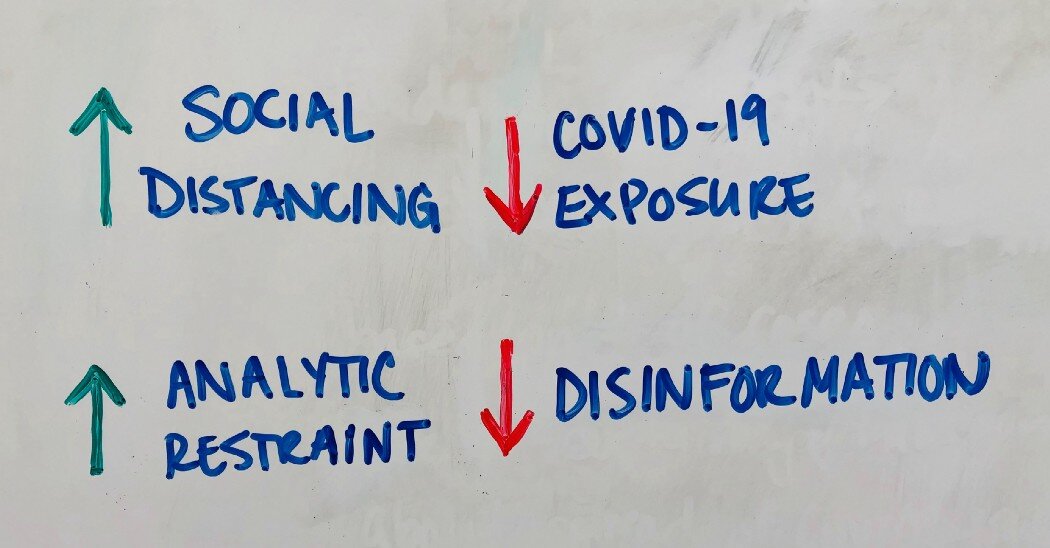Professional data scientists, analysts, epidemiologists, and social scientists who are burning the candle at both ends, working tirelessly to figure out how to use data for good in the face of the novel coronavirus pandemic, I see you. I’m right in the thick of it with you.

More than a dozen different dashboards, maps, and “panels” depicting different aspects of the COVID-19 pandemic emerged over the last week, with more appearing every day. Some are excellent. They are responsible, transparent, based in facts, and produced by experts. Most are not. And those that aren’t, are fueling the most insidious form of disinformation in a time when what people and leaders need most is truth and clarity.
I applaud those of you who are not letting the opportunity for headline-grabbing click-bait reporting compromise your standards. Now, more than ever, it is critical to have discipline. This requires the patience to be methodical and responsible at every step of your process: how you source data, how you apply your expertise to process and analyze it, and when you seek peer review. You must also think just as critically about how you will present your work to an audience, understanding clearly what question you are trying to answer and why before you publish your conclusions.
It is hard. Especially at times like these when everyone wants answers NOW. I struggled with it myself earlier this week. If I could only get a product done in the next few days, I might have the opportunity to help the public understand what is going on in their communities, inform leadership at the highest levels of government, and grow my business in ways I’ve always dreamed of!
Wait. Stop. Think.
Nothing is more thrilling for an intelligence analyst than empowering good decision-making; knowing you had an impact. You just grind it out as hard as you need to, without sleep, living on bad energy drinks, patiently waiting for data processing jobs to finish, tirelessly retooling and restarting them when they inevitably crash, just to have a shot at it.
But those of us who have directly supported policymakers, military, or intelligence operations understand the grave seriousness and heavy responsibility that comes with that pursuit. Unlike commercial companies or academic researchers, we have felt the deep, plaguing sense of guilt and responsibility when we got it wrong. When lives were lost. Just as devastating was when we got it right, but forces outside of our control led to human loss. We learned the discipline of analytic restraint the hard way. We were humbled by the complexity of the world every single day.
An intelligence analyst’s job requires the utmost discipline: the ability to be patient, methodical, transparent, and rigorous even in the face of the most intense production pressure. And for anyone out there wanting to provide analysis or insight or data to help slow the spread of COVID-19, your job does, too.
The COVID-19 pandemic is proving to be an analytics bonanza. Somehow, overnight, data providers have magically transformed into analytics shops. Journalists are data scientists, and poof! data scientists are now epidemiologists. The intelligence analyst inside of me is screaming:Stop! For the sake of us all, please just STOP!
Look, I understand. You want to help. You have talent, skills, expertise, access to kick-ass information, slick GIS or other data viz software — there’s got to be something you can do, right? There is. But now is not the time to make interdisciplinary leaps. You can do so much more good by staying in your lane and sharing your work responsibly. At best, overreaching, overstating, and overgeneralizing undermines the value of your effort. At worst, your “contribution” can fuel fear and put lives at risk.
Becoming an expert in just one of the domains critical to understanding the complexity of a global pandemic is difficult enough, requiring years of learning, application, and experience. Becoming an expert in multiple domains is even more specialized, technically complex, and challenging. There are precious few humans on the face of this planet that qualify, and it is highly unlikely that you are one of them. But that’s okay. Lean into your strengths and courageously practice intellectual humility. Those are the unicorns we need right now.
I am asking, pleading you all to please, for the love of humanity, practice analytic restraint. Think of it as the “social distancing” of analysis and reporting. It is our best tool to stem the spread of disinformation. It is in everyone’s interest. Lives depend on it.
